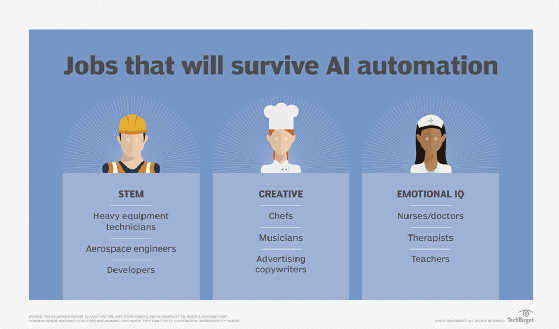AI taking jobs is not a concern for certain workers
AI and job loss may turn out to be among the biggest stories of this century, but workers in certain fields don't have nearly as much to worry about as others.

When it comes to the issue of AI taking jobs, most people are pessimistic. The pace at which software is replacing human jobs continues to pick up, and the list of industries set to be swamped by automation is growing.
But AI won't eliminate all work. In fact, there are a variety of broad job categories and specific work roles that will be difficult for machines to automate in the near term. This infographic explores some of those jobs.
Fears over the coming wave of AI-related job losses are well-founded. A heavily cited study from the University of Oxford found that 47% of total employment in the U.S. is at risk of automation. And while most experts counter that AI will create new jobs that we can't even imagine right now, growing overall job numbers, there is undoubtedly going to be disruption as automation changes traditional job functions.
However, not every job sector will be hit equally by this looming wave of automation.
STEM roots stay grounded
Science, technology, engineering and math jobs, also known as STEM, will be difficult for machines to automate in the near term. In a sense, the reason is obvious.
These are the jobs that create the algorithms that automate jobs. While it may someday be possible to imagine self-generating machine learning algorithms that program themselves, we're not there yet. For the foreseeable future, at least, we still need someone to program the machines.
There are also a number of deeply technical engineering and technician jobs that will be challenging for machines to fill. These roles typically take a combination of physical dexterity, mental creativity and an ability to respond to unforeseen challenges that machine learning algorithms simply don't possess.
Human services, creative arts endure
Workers in creative fields also don't have to worry about AI taking jobs from them. People whose jobs heavily involve writing, music composition and illustration can expect to remain employed for some time to come. The reason is that machine creativity is still nascent.
There are efforts underway to make AI more creative. It is being used to generate music, film scenery and text. But the general consensus is that these efforts fall well short of human capability.
Algorithms can generate short text reports on stock earnings, but don't expect them to replace journalists en masse anytime soon. Similarly, AI can produce simple filler music for podcasts, video games or other brief commercial needs, but things like film scores still require a human touch.
And then there are jobs that require human interaction. Doctors, therapists, dentists and teachers all deal with a high-level of one-on-one personal interaction. While AI developers have made progress in building chatbots and virtual agents that seem to respond naturally to free-form queries, most simply pull canned responses from a library of prewritten replies.
A bot may be good enough for customer service interactions, but more personal situations demand a higher level of emotional intelligence and the ability to respond naturally to unexpected prompts. Bots simply can't perform at that level. The risk of AI taking jobs from these professionals is low -- at least for now.